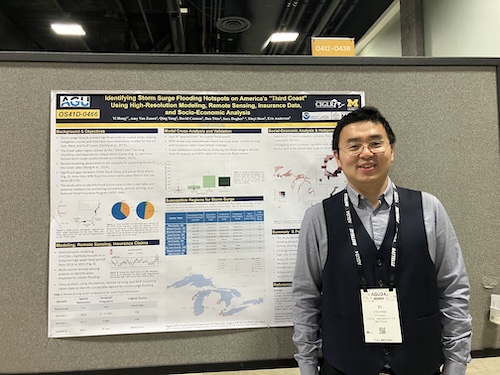
 back to all news
back to all news
Inventing tomorrow: Yi Hong
Image

March 21, 2025
Yi Hong is an assistant research scientist at the Cooperative Institute for Great Lakes Research, which is hosted by the University of Michigan School for Environment and Sustainability (SEAS). We asked him to share more about her work in this brief Q&A.

What is your research focused on?
My research aims to enhance hydrologic modeling and forecasting systems to improve water resource management, particularly in the Great Lakes area.
Specifically, I focus on:
- Creating and refining hydrologic models to more accurately represent water cycle processes, such as precipitation-runoff relationships, the movement of pollutants, and variations in lake levels.
- Enhancing water level forecasting tools in partnership with NOAA, USACE, and ECCC to boost seasonal and long-term predictions for the Great Lakes.
- Combining hydroinformatics and data-driven techniques with physically based models to improve forecasting precision and the assessment of uncertainty.
- Evaluating risks of coastal flooding and urban water issues by developing models that predict flood hazards resulting from extreme weather events and climate change.
- Collaborating with stakeholders and decision-makers to ensure that advancements in modeling convert into practical tools for policy and infrastructure development.
What is the impact of this research?
The influence of my research is directly enhancing water management and climate resilience in the Great Lakes Region and beyond by:
- Advancing operational forecasting: My research plays a vital role in developing the next-generation National Water Model and the Great Lakes Regulation and Routing Model, leading to more accurate water level predictions utilized by regional water managers and policymakers.
- Facilitating flood risk assessment and management: By improving hydrological and coastal models, my work aids in forecasting compound flooding risks and provides practical solutions for urban and coastal areas confronting challenges posed by climate change.
- Enhancing water quality management: My modeling of urban stormwater and pollutant transport supports the development of pollution control measures, which help lessen the effects on aquatic ecosystems and drinking water sources.
- Offering decision-support tools: Collaborations with NOAA, USACE, ECCC, and local organizations ensure that the findings from my research translate into practical applications, such as adaptive water regulation approaches and early-warning systems for extreme weather events.
- Shaping policy and infrastructure planning: By combining research with stakeholder engagement, my work contributes to science-based decision-making in the management of transboundary water resources and the protection of communities from the impacts of climate change.
Learn more about SEAS research scientists:

